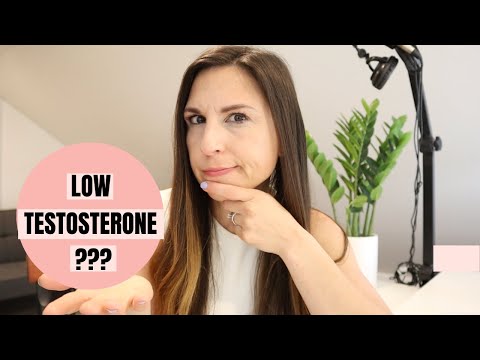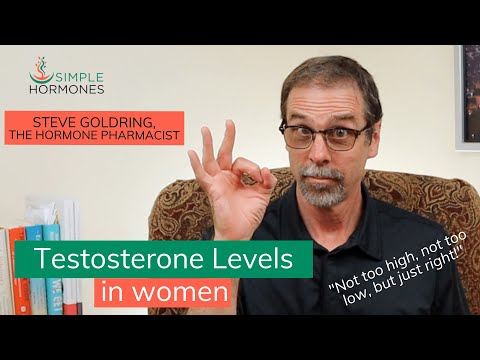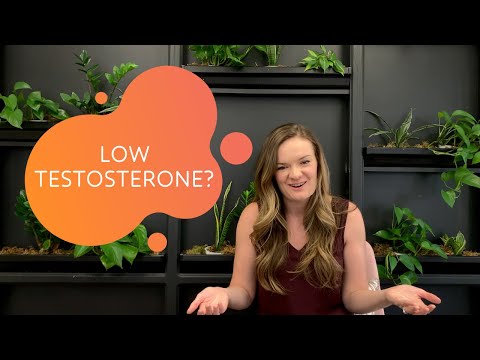Low testosterone in women is a topic that doesn’t get nearly the attention it deserves. Often brushed aside or misdiagnosed, this hormonal imbalance can have far-reaching consequences on both the body and mind. While testosterone is commonly associated with men, it plays a vital role in women’s health, influencing key aspects like muscle mass and mood regulation. In this article, we’ll dive into the hidden effects of low testosterone in women, explore how it differs from high testosterone levels, and offer insights into treatment options and lifestyle changes.

Understanding Low Testosterone in Women: A Hidden Hormonal Imbalance
When we talk about low testosterone in women, we’re not just discussing a deficiency of a hormone; we’re highlighting an essential part of health that can affect energy, emotional stability, and physical strength. Women naturally produce testosterone, but as they age, levels often decline, particularly during and after menopause. This decline can lead to symptoms that can easily be written off as just “getting older,” but ignoring them can lead to significant implications for overall wellness.
It’s important to draw a clear line between low testosterone and high testosterone levels. While low testosterone can leave women feeling drained and unmotivated, high testosterone can be equally troubling. Women with high testosterone may face issues such as irregular menstrual cycles, excessive hair growth, and even conditions like polycystic ovary syndrome (PCOS). Striking a balance is crucial for maintaining optimal health and vitality.
Understanding these nuances allows women to advocate for their health more effectively. If you’re experiencing symptoms of low testosterone, don’t hesitate to speak up. After all, awareness is the first step to empowerment!

7 Hidden Effects of Low Testosterone in Women
1. Fatigue and Low Energy Levels
Feeling tired all the time? You’re not alone. Women suffering from low testosterone often report fatigue that doesn’t fade, even with rest. Research from the University of California, San Diego, found that their energy levels resembled those of individuals with chronic fatigue syndrome. This relentless exhaustion can hinder daily activities and sap the joy from life.
2. Decreased Muscle Mass and Strength
3. Mood Disorders and Anxiety
Low testosterone doesn’t just impact the body. It plays havoc with your emotional state too. A Hormone Health Network survey discovered that women with low testosterone experienced anxiety levels more than 50% higher than those with balanced hormones. This hormonal imbalance disrupts neurotransmitters and significantly exacerbates mood disorders.
4. Reduced Libido and Sexual Dysfunction
5. Weight Gain and Metabolic Issues
Hormonal imbalances can flip the script on weight regulation. Women facing low testosterone often struggle with unexpected weight gain despite efforts with diet and exercise. Research from the National Institute of Health suggests that low testosterone correlates with an increase in visceral fat, raising the risk of metabolic syndrome.
6. Increased Resting Heart Rate
Did you know that low testosterone might speed up your resting heart rate? A longitudinal study by Johns Hopkins University found that women with lower testosterone levels had a resting heart rate about 5% higher than those with normal levels. This could pose an increased risk for cardiovascular problems, making awareness crucial.
7. Bone Health Concerns

High Testosterone in Women: The Other Side of the Spectrum
While we’re on the topic, let’s not forget about high testosterone levels. They can be just as troublesome. Women with elevated testosterone may experience symptoms such as excessive hair growth (hirsutism), acne, and irregular menstrual cycles. This condition, known as hyperandrogenism, is strongly associated with insulin resistance and can complicate health even further.
Balancing testosterone levels remains a delicate dance. Genetics, lifestyle, and environmental influences all play a role, making it important to focus on the whole picture rather than just specific symptoms. Understanding both low and high testosterone can guide you toward a healthier pathway.

Navigating Treatment and Lifestyle Changes
If you suspect you might be suffering from low testosterone, it’s time to consult a healthcare provider for comprehensive hormonal testing. Treatment options vary. Some women may benefit from testosterone replacement therapy, while others can achieve hormonal harmony through lifestyle changes focusing on diet and exercise.
Regular strength training is not just beneficial; it’s essential. It naturally boosts hormone levels and builds muscle. Aim for a diet rich in healthy fats like avocados and fish, which positively influences hormone production. Remember, brands like Increlex and Testim offer testosterone replacement therapies tailored for women but always consult a medical professional before starting any new treatment.

Embracing Holistic Awareness in Women’s Health
Understanding low testosterone in women is crucial. It’s not just about feeling off; it’s about taking charge of your health. As the conversation around women’s health continues to evolve, acknowledging the role of testosterone can help women find balance and vitality.
Educating ourselves on the symptoms of low testosterone can change lives for the better. The more we talk about it, the less stigmatized it becomes. Ultimately, awareness and proactive management of hormone levels can empower women and lead to healthier, more fulfilling lives. So don’t shy away—embrace your health and advocate for yourself. It’s time to get shredded, gain muscle, and feel absolutely fantastic!
Low Testosterone in Women: Fun Trivia and Interesting Facts
Understanding the Impact
You might be surprised to learn that low testosterone in women is more common than most people think. This hormone is not just a man’s game—women produce it too, albeit in lower amounts. When the levels dip, it can affect energy, mood, and even libido. Speaking of unexpected energy, did you know that the movie Nanny Mcphee returns features a character who embodies resilience? Much like women facing low testosterone, they’ve got to find strength within themselves.
Interestingly, testosterone also plays a role in muscle mass and bone density. As muscle strength diminishes, it can mimic the effects of aging. It’s kind of like comparing two types of pain relievers in an ibuprofen Vs acetaminophen showdown—different mechanisms but similar outcomes. Moreover, studies suggest that addressing low testosterone levels may improve overall health, including managing conditions like elevated blood pressure. If you’re wondering,Can diabetes be reversed?, it’s all interconnected. Hormones significantly influence everything from insulin sensitivity to overall vitality.
The Hidden Effects
Low testosterone in women can lead to fatigue, mood swings, and memory issues. Some folks might feel overwhelmed or lost, akin to the feeling one might get watching Kikis as characters grapple with life’s ups and downs. Another lesser-known fact? Experts have linked low testosterone levels with a greater likelihood of developing anxiety or depression. Life can get cloudy—much like dealing with a clogged tear duct that hinders clarity.
Curiously, testosterone’s effects extend to skin health, too. Women with low levels often notice increased skin dryness or the appearance of fine lines. Talk about a double whammy! However, making lifestyle changes can help boost energy and improve hormone levels. Those who wonder about physical manifestations might have more intrigue surrounding birthmark studies, as our bodies express hormonal balance in various ways. Plus, celebrities like Nat Kelly cole often remind us how healthy living reflects in both personality and appearance, making low testosterone in women not just a medical issue, but also a lifestyle concern.
Takeaway
While low testosterone in women might seem like a niche topic, it’s packed with hidden effects and interesting trivia that can impact many facets of life. Recovery doesn’t come easily, but knowing the facts can help women tackle health challenges head-on. After all, as seen in the inspiring careers of figures like Ali Hewson and even the numerous “Vincent D’Onofrio movies and TV shows, perseverance pays off!



























